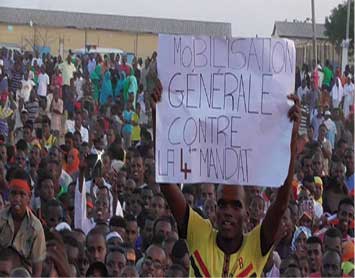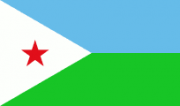
In 2016, we submitted to the UN Mechanisms 7 communications regarding 3 individuals.

DJIBOUTI
 Our Concerns
Our Concerns
- Widespread torture and ill-treatment in detention and police custody;
- Arbitrary arrests of real and perceived political opponents;
- No fair trial guarantees;
- Restrictions on the freedom of expression and of peaceful assembly and the excessive use of force by the police and the army;
- Impunity for perpetrators of human rights violations and a lack of independent and impartial investigations.
 Recommendations
Recommendations
- Amend the domestic legislation on torture and ill-treatment to ensure that it is in conformity with the Convention against Torture;
- Ensure that the Standards Minimum Rules for the Treatment of Prisoners to anyone detained and apply all fair trial guarantees;
- Guarantee the freedoms of expression, association, and peaceful assembly and ensure that these rights may be exercised freely;
- Fight against impunity by prosecuting any perpetrator of serious human rights violations at all levels.
 Upcoming
Upcoming
- September 2017: Submission of Alkarama’s report to the Human Rights Council in view of Djibouti’s third Universal Periodic Review in May 2018;
- 1 November 2017: Submission of Djibouti’s second periodic report to the Human Rights Committee.
2016 was marked by recurring violations of civil and political rights in Djibouti, a country dominated by a one-party system. In April 2016, President Ismail Omar Guelleh was re-elected for a fourth consecutive term with 87% of the votes, following elections that were widely criticised for having been manipulated, but to which a repressed opposition, sidelined from the country’s political affairs, participated.
The electoral process was accompanied by serious violations of the country’s international human rights obligations, with the authorities systematically silencing members of the opposition and other critical voices, including journalists and human rights defenders. The government crackdown took the form of widespread arbitrary arrests and detention, summary executions and torture, as well as the closure of newspapers, the persecution of cyber activists, and travel bans being issued against human rights defenders.

Systematic suppression of freedom of expression through arbitrary arrests
Since Guelleh’s election for a fourth presidential term, dissenting voices in the country are on the rise, often expressing themselves through cyber activism, social media outlets, and the press. However, in many cases, following any public manifestation of criticism, the authorities have been quick to arbitrarily arrest, detain, judicially harass, and sometimes torture those who have merely expressed their opinion.
This was, for instance, the case of Kadar Abdi Ibrahim, co-director of the oppositional Aurore newspaper in Djibouti City. On 19 January 2016, Mr Ibrahim was condemned to a two-month suspended prison sentence and the publication of his monthly newspaper was also suspended for a similar period of time. Mr Ibrahim faced harassment following the publication of the newspaper’s fifth edition, which included a photograph of a seven-year-old girl who died during the violent dispersal of a religious ceremony by the police and the army on 21 December 2015; an incident that led to numerous deaths and left dozens injured. In August 2016, Mr Ibrahim was arbitrarily arrested for a second time and his newspaper suspended for having reported on the travel ban imposed by the authorities on a former Djiboutian Minister.
Similarly, Alkarama referred the case of Abdi Aden Cheik Ali, another peaceful opposition activist, to the UN Special Rapporteur on the promotion and protection of the right to freedom of opinion and expression. Mr Cheik Ali was arbitrarily arrested in August 2016 and detained for three months. His arrest and detention are seen as a reprisal for the disseminated a video, which denounced the water shortage in the region of Ali-Sabieh, and the blame he placed on the Djiboutian authorities for their inaction in relation thereto.
While documenting these cases, Alkarama identified the following pattern: victims are usually arrested arbitrarily, without any warrant, before being placed in custody in various police stations across the country; they are deprived of their right to contact their legal counsel and families; accused of “spreading false information” or “insulting State officials”; and consequently subjected to unfair trials, often sentenced to several months of imprisonment and/or heavily fined. Unfair and often expeditious trials are symptomatic of the Djiboutian judiciary system, which lacks independence and impartiality, as it acts as a branch controlled by the government to judicially harass and silence any voice of dissent.

Coerced confessions and poor conditions of detention
Journalists, human rights defenders, and members of the opposition have been subjected to numerous violations when placed in detention. Many have been tortured at the hands of the security services or law enforcement agents, be it to extract incriminating confessions or as a retaliatory measure.
Moreover, detention conditions are also appalling, with poor hygiene, severe overcrowding, and no access to appropriate nutrition and healthcare. This type of treatment is usually aimed at spreading fear among detainees and dissuading these individuals from continuing their activism.
For example, Djiboutian journalist Mohamed Ibrahim Waiss was arbitrarily arrested and detained in January 2016 after having published articles expressing criticism towards governmental policies. He was arrested by police forces on 11 January 2016, and subsequently tortured to obtain the password of his Facebook account, in order to monitor his online activities. In critical physical condition as a result of the torture perpetrated against him, he was transferred to the central prison of Gabode in Djibouti City, where his suffering was aggravated by the poor conditions of detention, poor hygiene and malnutrition. He was also denied medical care and family visits.
The aforementioned accounts of severe human rights violations not only cast doubt on Djibouti’s real commitment to abide by its international legal obligations – in particular the International Covenant on Civil and Political Rights ratified in 2002 –, but also illustrate the intentional nature of these acts; aimed at silencing any dissenting voice and retaliating against those critical of the government. There is an urgent need for the country to allow for political pluralism and to engage in democratic reforms so as to ensure that basic rights and fundamental freedoms are respected and protected.

CRACKDOWN DURING THE PRESIDENTIAL ELECTIONS
In 2010, after Guelleh was elected twice president – in 1999 and 2005 –, the National Assembly of Djibouti amended the country’s Constitution, allowing him to stand for a third term in 2011. This move was met with sharp criticism, as a result of which the country was shaken by a large wave of protests. While dissent was brought down swiftly, the opposition boycotted the 2011 elections and Guelleh became president for a third consecutive term.
Following Guelleh’s announcement to run for a fourth term in April 2016, the authorities launched a crackdown on peaceful opposition gatherings, which were met with an excessive use of force. Alkarama reported on one such incident. On 21 December 2015, police forces raided the home of USN member, Djama Amareh Meidal, where an opposition meeting was taking place. The police used excessive force, thereby resorting to the use of lethal weapons and tear gas against those present at the gathering, including in particular, Said Houssein Robleh, a deputy who had already been harassed by the authorities; Ahmed Youssef Houmed, president of the USN; and Hamoud Abdi Souldan, former Minister of Muslim affairs. The three men were injured, urgently hospitalised and remained under intensive care.